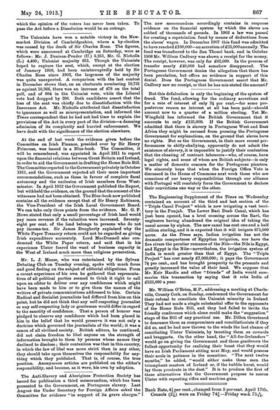Mr. L. J. Maxse, who was entertained by the Sylvan
Debating Club on Tuesday evening, spoke with much force and good feeling on the subject of editorial obligations. From a recent experience of his own he gathered that representa- tives of all political parties seemed to think it right to call upon an editor to deliver over any confidences which might have been made to him or to give them the names of the writers of private communications addressed to him. Certain Radical and Socialist journalists had differed from him on this point, but he did not think that any self-respecting journalist or any self-respecting lady or gentleman would differ in regard to the sanctity of confidence. That a person of honour was pledged to observe any confidence which had been placed in him in the belief that he would preserve it was not only a doctrine which governed the journalists of the world ; it was a canon of all civilised society. British editors, he continued, did not claim freedom to libel anyone on the strength of information brought to them by persons whose names they declined to disclose ; their contention was that in this country, in which the law of libel was more strict than in any other, they should take upon themselves the responsibility for any- thing which they published. That is, of course, the true position. Anonymous articles are published on the editor's responsibility, and become, as it were, his own by adoption.










































 Previous page
Previous page